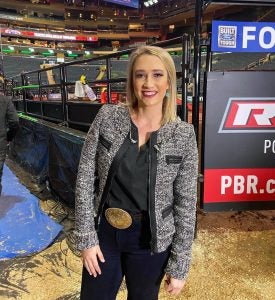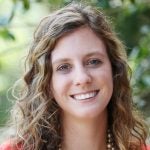Agriculture is its own culture, its own community. That community is built by those involved in the industry. But women in agriculture have a special ability to foster and build that community.
Courtenay DeHoff, a television host and woman in agriculture, recently featured an Ag Women series on her podcast, “Cowgirl Problems,” and highlighted parts of it on Instagram. The stories women have shared on her podcast have helped her better understand and see that the agriculture community is made up of all different kinds of people who all play a crucial role.
Through this podcast and her experience in the industry DeHoff shared three things that can help build a community as women in agriculture:
- Don’t be afraid of failure and be open to failing forward
- Be willing to sharing your story
- Support other women
Failure is a part of life; once that is accepted you can learn from your failures and move forward. This lesson of not giving up and failing forward is an important one for all of agriculture — continue looking toward the future and the next step to improve.
Everyone has a story tell, and sometimes your story may be exactly what someone else needs to hear. Not all of the stories are easy to discuss, pleasant, or pretty, but being open can be beneficial for both the sharer and the listener.
DeHoff recently had a guest on her podcast who provided the perfect example of having hard conversations. Adrian Brannan shares the “Dear Cowgirl” posts on social media and blogs. Brannan shared about surviving and overcoming domestic violence. At one point, she said if this was too much or over the top that it could be edited, but DeHoff knew that it could help someone else. “It’s not easy to talk about the hard things – the failures, the stress, the struggles, the things that don’t make for good dinner conversation. But those are the most powerful stories because at the end of the day someone else is going through what you’re going through and you don’t even know,” said DeHoff.
Sharing her own story helped her realize the connections that could be built through being real and authentic. When she moved to New York, she posted a picture of herself dressed up to go to New York Fashion Week. The post got a lot of negative reactions — people called her a traitor and questioned whether she was cowgirl enough because of her outfit and heels.
Later on, she followed up with a post sharing that she was important to the agriculture conversation regardless of her beliefs, even though she wears heels and dresses, that she was vital to the conversation because it afforded her opportunities others might not have.
“Because of my experience, locale, and position, I am going to be invited to sit at tables that others in the agriculture industry would not be invited to, and other women who are boots on the ground on farms and ranches every day are going to be invited to sit at tables that won’t even know I exist because I’m not involved intimately in the day-to-day operations,” said DeHoff.
The willingness of all in agriculture to sit at different tables is incredibly important to bridging the gap that exists between the agriculture industry and those outside of it.
After sharing her story on Instagram, so many people, men and women alike, said the feeling of not being important to the conversation resonated with them. They then shared their story of how they were crucial to the conversation. This built a community not only around DeHoff but all who had shared.
When asked about struggles as a woman in agriculture, hundreds of people messaged DeHoff sharing personal stories that reflected two sentiments: 1) not being taken seriously because of looks or femininity, and 2) being torn down and not supported by other women. Her followers shared that women were typically tougher on them as a woman in agriculture than men. She shares that is one of the biggest things that needs to be addressed, not only in our industry but in the world as a whole.
“If we expect the world to take us seriously, first we have to take each other seriously,” said DeHoff.

DeHoff ultimately asked her followers to empower and uplift each other and to share a quote, their favorite part of being a woman in agriculture, or anything else that was positive. There were only around five messages. So many more people wanted to talk about the negative and complain; fewer seemed willing to find and share the positive. That’s what builds community, sharing the hard stuff and the struggles but also being positive and empowering others.
“Culture and community are my favorite things about being a woman in agriculture,” said DeHoff. “I feel so proud and blessed to have been born into and involved in an industry that most people only romanticize about.”
The agriculture industry is lucky to have each of you as a part of it. It is lucky to be made up of all kinds of people. That is what makes agriculture is so strong. The community that exists can be built either in person or online.
“Does the community need to work on some things?” DeHoff asked. “Absolutely, but I truly believe there is no community as loyal and honest as the agriculture community and they will be there in a bind.”
Take some time and say something encouraging to a woman in agriculture today, lift someone up. The world is full of negativity and uncertainty — use your specific skills to build a community and make someone feel like they belong in it.
Michelle Bufkin is a freelance communication specialist whose goal is to help producers bridge the farm-to-plate knowledge gap that exists with consumers today. She uses her full-time position as the Membership and Communication Director at the Arkansas Cattlemen’s Association to interact with producers and work on building that connection.



